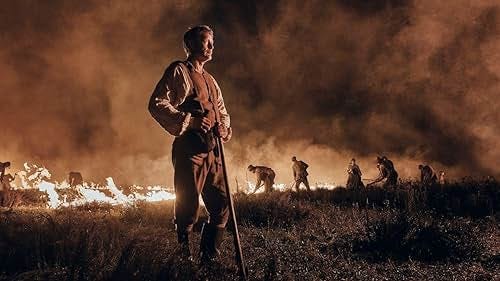The Promised Land is a promising but ultimately unsatisfying portrait of 18th century hierarchies.
You try surviving in the Danish hinterlands with only a hot peasant girl and some potatoes. In this battle of the bastards, the handsome guy wins.
Watching The Promised Land recently at the Palm Springs International Film FestivaI, I felt like someone had leaked to the Danish Film Commission my audacious script about settling the impervious Nebraskan Sandhills in the late 1800s. But The Promised Land’s man-against-nature, man-against-monarchy, man-against-local-asshole story set in 1750s Denmark has a slightly more crowd—pleasing premise. Unlike the brutal Swiss-French curmudgeon of my epic Western, the handsome, penurious Silesian War hero Captain Ludvig Kahlen (Mads Mikkelsen) is more posh and rarefied, though as rigorously focused on the daunting task at hand: bringing the harsh unforgiving prairie to heel. Captain Kahlen's goal is not only to create a community in the Danish hinterlands but to earn in return the noble title denied him by his bastard birth. The film’s Danish title is Bastarden, which is more fitting than the vague, bland, and lifeless The Promised Land, but here we go again: foreign producers underestimating English-speaking audiences.
Kahlen’s nemesis, Frederik De Schinkel (Simon Bennebjerb), a cartoonishly evil local nobleman and magistrate who claims to “own” the Jutland Heath ostensibly under King Frederick’s aegis, is a creative and colorful sadist. His perverse brand of water torture is impressive (if only our CIA had tried this in Iraq). Yet his cruelty feels perversely necessary: the monarchy-sanctioned Kahlen is a true threat, especially if he makes the Jutland moors bloom. The peasant workers are too, as they slowly gain glimpses of a better life. But in this battle of the bastards, we know who’s going to triumph.
It’s no surprise that after proving to the king’s men that he can grow potatoes on the moors using mostly his resources, Kahlen obtains his coveted title and all the German peasant workers he needs. Through a series of strangulated events, Kahlen loses the workers but keeps the title. But achieving his twin goals does not appease our Stoic romantic. He leaves the land he worked so hard to settle—thereby forfeiting his noble title—and gallops off in search of the impossibly hot servant girl, De Schinkel’s former maid Ann Barbara (Amanda Collin), who helped in assassinating De Schinkel and is now imprisoned. Who needs money and territory when you can rescue the tall blonde Danish lass? Jutland Heathcliff anyone?
Sorry, Danes, but I am not sure that would fly all too well in the ruthless cruelty of the 18th-century world you evocatively depict here. Still, with the exceptional Mads Mikelson attached, one always hopes for subtle greatness, and in rare moments here Mads reaches it, though he has yet to match the early promise he displayed in The Hunt and A Royal Affair. Helmed by Nikolaj Arcel (A Royal Affair) with a measly $8 million budget, The Promised Land is grand and impressive, though––after all the Sturm and Drang––it feels oddly cliche, flat, and hollow.
It never answers a key question: why is this film being made now? The answer must be our era’s obsession with “social justice.” But that shoehorned American derangement also makes the film weirdly jarring, as it attempts to jam in Academy-pleasing Woke indoctrination via the charming dark-skinned Romani girl Anmai Mus (Melina Hagberg) who is ostracized by those mean old German settlers. By her mere presence, I can hear the producers scheming.
While the Academy of Motion Pictures will love how the film’s white filmmakers met the Academy’s racist Stalinist person of color quota inside a decidedly 1750s Scandinavian tale, I suspect the film’s audience is more domestic. This is a romantic fairy tale for Danes: “Before we were voted the world’s happiest people, we too were bastards. Isn’t Socialism wonderful?”







